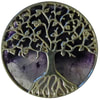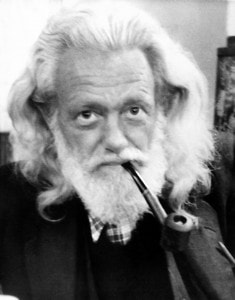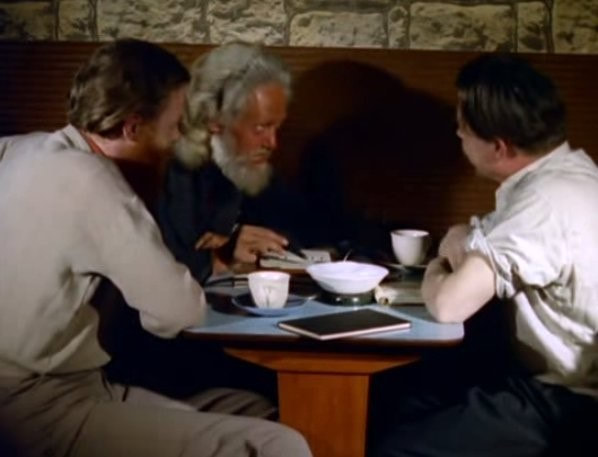|
Ernest Page ca 1960 from http://adocentyn.net/poetry-of-ernest-page/ Ernest Page was a fascinating Soho character, well-known to members of the group in the late 1950s and 60s. He was famous as the astrologer who gave readings for two and sixpence in Soho cafés. He lived rough and was always ready to help the homeless and vulnerable. People of all kinds would crowd around his café table for the sake of the talk. Writers, artists, philosophers were drawn into it, together with Soho’s habitue’s of all kinds, men, women, the old, the young, the ambitious, the derelict. Ernest was also a published poet, and perhaps most surprisingly (and unknown to most) he was also the warden of a secret magical order. In this work he was a force for reconciliation and his wide and genial sympathies encouraged membership from many different traditions. Dropping Out Ernest’s obsession with astrology began in 1956, when he suddenly decided to ‘drop out’, giving up his job with the Post Office and his accommodation in Highgate Hill; he felt that living between four walls had become too much of a burden. Ernest had been brought up in a well-to-do family in North London, and in his teens he was a lay preacher. In mid-life he converted to the Catholic Church, but then in that fateful year 1956 he suddenly walked out of church during Mass. He never abandoned his faith though, and his brother Ralph, a Catholic Priest, said of him ‘I preach the gospel – but Ernest practises it.’ Ernest (centre) with members of the Soho Group (a meeting staged for a film). Memories of Ernest Ernest was a close friend of the husband-and-wife team of Vivian Godfrey and Leon Barcynski, who wrote a series of books about the magical order they all worked in: “In Soho the fragile figure with the snow-white hair and beard was well-known, going through the narrow streets carrying a large leather bag in each hand (the one filled with astrological books and papers, the other with personal possessions) or presiding through the night at a quiet table in the corner of a crowded coffee-bar, drawing meticulous horoscopes and annotating them in his fine archaic script, checking the accuracy of his work by making quiet and often astounding observations on his client’s past life, sometimes spending an hour or more sifting the evidence for a particular time of birth: and all for a most nominal fee, or for no fee at all if he so decided: this work, like everything else, he did for the love of it.” The Magical Philosophy, Book I (Llewellyn, 1974) p. 165. Alan Bain, one of the founders of the Soho Group, writes about learning astrology from Ernest: “Ernest had worked for the Post Office for many years, until he discovered astrology, whereupon, overnight (as it seemed to him) he left his job to devote himself full-time to its study. And that is exactly what he did, even to the extent of finding himself homeless and often penniless. About astrology though he would hold forth enthusiastically for hours to anyone he thought was serious about sharing his study. I was, and he held forth! A better mentor I could not have found. Alan Bain on Ernest Page (read more here). Norman Martin, a member of the Soho Group, remembers Ernest as a friend: “Ernest wore a very clean raincoat, although he slept rough outside or in the British Museum reading room (his hair covering his face so they couldn’t see he was sleeping). Ernest was a Virgo, so quite finicky about appearance.” Norman gave Ernest a test – naming a month in the past and challenging Ernest to tell him what, if anything, had happened then. Ernest managed to deduce that Norman had travelled to Paris, which was true! He then explained how he had worked this out from the chart. The Poet Ernest was a keen poet, and some of his poems were published in a book entitled 14 Poems in 1949. He was also the subject of a poem, written by Arthur Jacobs, entitled The Astrologer: His flat and battered notebook Is like grey parchment with symbols Scrawled in its dust out of Babylon. He will set, for three and sixpence, Round your magic hour of birth The stars that in their movements Tell him the secrets your appearance Chose for itself. He is no crank, But a true survival from an ancient Art that promises trends, not detailed Incident. Consult him at your peril: For whether or not his assured vision Excites the protest of your intellect, Past and future turn before his gaze, Mortality lies naked beneath his fingertips. A. C. Jacobs Collected Poems & Selected Translations (Menard Press: 1996)
0 Comments
Leave a Reply. |
AuthorsArticles are mostly written by Cherry and Rod, with some guest posts. See the bottom of the About page for more. A guide to all previously-posted blogs and their topics on Soho Tree can be found here:
Blog Contents |
Proudly powered by Weebly



 RSS Feed
RSS Feed